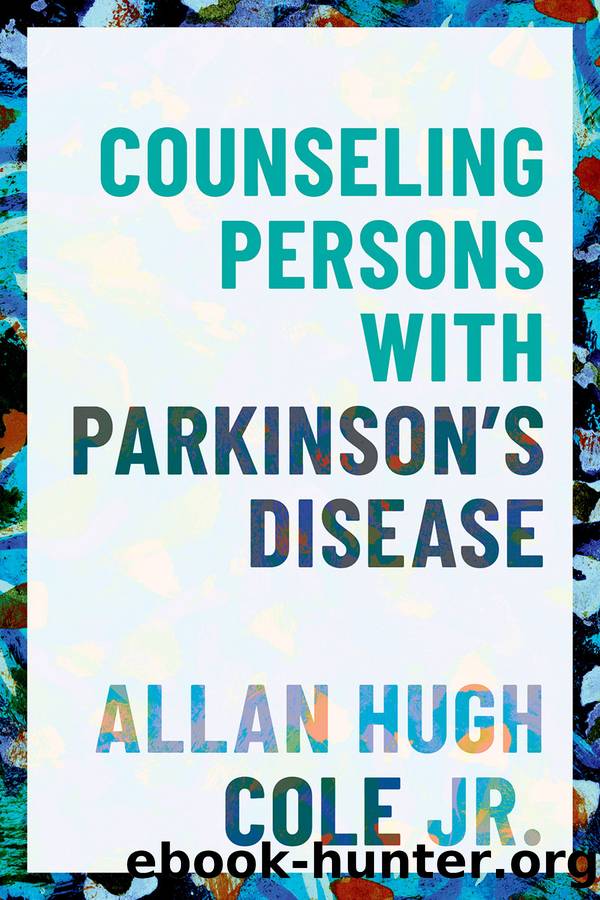Counseling Persons with Parkinson's Disease by Allan Hugh Cole Jr.;

Author:Allan Hugh Cole Jr.;
Language: eng
Format: epub
Publisher: OUP Premium
Published: 2021-01-15T00:00:00+00:00
Key Facts
Vocational concerns relate to questions of purpose, which get expressed in statements and questions pertaining to oneâs values, identity, and goals, all of which may or may not center on oneâs job, career, or other chosen life tasks.
Mortal Concerns
Few experiences raise your awareness of mortality, including your own finitude, more than a serious medical diagnosis. Although Parkinsonâs disease is not fatal per se, it is progressive and debilitating, and, over time, many who have it will experience a loss of functioning that results in disability and significant health problems. Consequently, those living with Parkinsonâs may focus their attention on what I am calling mortal concerns.
Mortal concerns have to do with three principal matters: (1) life after death, (2) how much of life is yet to be lived before death, and (3) whether life has been meaningful, faithful, and trueâworthwhile, in other words. This focus suggests that mortal concerns relate closely to vital, relational, and vocational concerns.
Counselors frequently meet with persons for whom mortality weighs heavily on their minds, whether concerned for a loved one or for themselves. Many people think of death as terrifying, so much so that they seek to keep from thinking about it as much as possible, which has become normative in a North American context.
Three decades ago, a cultural anthropologist by the name of Ernest Becker observed just how terrified people are of death and the great efforts we take to avoid it. In fact, avoiding death and living fearfully in the midst of its eventuality become primary forces that influence how we live our lives. Introducing his bookâs subject matter, Becker writes, âOne of the great discoveries of modern thought: that of all things that move man, one of the principal ones is his terror of death.â30 If many people greatly fear death, some of them seek in counseling for a way to assuage their fear.
Most people think about mortality from time to time, about matters having to do with life, death, and life after death. However, again, those living with a chronic and progressive illness may think more often about mortality than ever before. This change has to do with living under the weight of the unknown, the search for resolution, and unanswerable but persistent questions, and, while the future is unknown, any perceived changes to oneâs body or mind may become more pronounced than in those who do not have Parkinsonâs or another chronic condition. In other words, a chronic illness may keep issues specific to loss and progressive deterioration squarely in front of you rather than receding as tends to happen for othersâthat is, healthy persons.
A person with Parkinsonâs reveals mortal concerns when raising questions or sharing concerns such as:
⢠What do you think happens to us when we die?
⢠Do you believe in an afterlife?
⢠How do I know that Iâll be OK when I die?
⢠I worry about my soul. I think I need to change my ways.
⢠Is there such a thing as Heaven and Hell?
⢠Will I see my loved ones again?
⢠Iâm afraid to get sick and die.
Download
This site does not store any files on its server. We only index and link to content provided by other sites. Please contact the content providers to delete copyright contents if any and email us, we'll remove relevant links or contents immediately.
Spare by Prince Harry The Duke of Sussex(4806)
Machine Learning at Scale with H2O by Gregory Keys | David Whiting(3666)
Fairy Tale by Stephen King(2975)
Will by Will Smith(2595)
Hooked: A Dark, Contemporary Romance (Never After Series) by Emily McIntire(2428)
The Bullet Journal Method by Ryder Carroll(2407)
Rationality by Steven Pinker(2159)
It Starts With Us (It Ends with Us #2) by Colleen Hoover(2059)
Friends, Lovers, and the Big Terrible Thing by Matthew Perry(2018)
Can't Hurt Me: Master Your Mind and Defy the Odds - Clean Edition by David Goggins(2012)
The Becoming by Nora Roberts(1932)
Love on the Brain by Ali Hazelwood(1828)
HBR's 10 Must Reads 2022 by Harvard Business Review(1703)
The Strength In Our Scars by Bianca Sparacino(1702)
A Short History of War by Jeremy Black(1679)
Leviathan Falls (The Expanse Book 9) by James S. A. Corey(1532)
515945210 by Unknown(1525)
Bewilderment by Richard Powers(1456)
443319537 by Unknown(1400)
